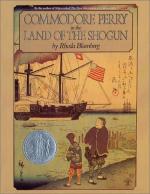
|
| Name: _________________________ | Period: ___________________ |
This test consists of 5 short answer questions, 10 short essay questions, and 1 (of 3) essay topics.
Short Answer Questions
1. What were the rumors about devils with white faces?
2. What do many historians think of Manjiro's influence?
3. What were the Mississippi and Susquehanna?
4. What did Commodore Perry pretend to be?
5. How many families could live there at a time?
Short Essay Questions
1. Who is Nakajima and what does he tell the Americans and what was Perry's response?
2. What was the composition of the American forces arriving in Japan?
3. Who were the daimyos?
4. What was the Tokugawa period and some of its positive aspects?
5. Where did messengers ride when the ships were spotted, and what was the consequence?
6. Describe the scene when the Susquehanna and Mississippi landed.
7. Describe the Dutch's visit to Edo to see the head Shogun.
8. Describe the two opposing camps to the idea of a treaty with the Americans.
9. Who were the samurai?
10. What was special about the Englishman, Will Adams?
Essay Topics
Write an essay for ONE of the following topics:
Essay Topic 1
Getting the most out of this novel requires some familiarity with the Japanese culture. Choose one of the following questions and write a well-developed, cohesive essay using examples from the text and your research or personal experience:
1. How homogenized was the Japanese nation at time of Comodore Perry's visits to Japan? What are some of their common beliefs? How do the Japanese live in today's world? What is the predominant religion of Japan? Is there more than one major religion? Was the Japanese culture patriarchal at the time of Perry's visit? Is it now?
3. How does the Japanese culture inform the plot and actions of Commodore Perry in the Land of the Shogun? Give examples.
4. Compare and contrast the cultures of two Oriental countries either at the time of Perry's arrival or as they are in the current era.
Essay Topic 2
The Tokugawa period in Japan's history is often called The Great Peace, as there were few domestic revolts. Trade prospered and cities grew. Literacy rose, the arts flourished and the people were civilized and the government organized. However, the people had no freedom and lived under a social system of incredibly rigid rules. Discuss the following:
1. Is peace worth the cost, i.e., the repression of new ideas; rigid class system and strict social mores? This is what it took for The Great Peace during the Tokugawa period?
2. Could the peace that Japan experienced have been an illusion? Do you think the lower classes felt peaceful being oppressed?
3. Research a time when another country had a golden age of peace and compare/contrast it to the era of The Great Peace in Japan. How are they alike? How are they different? Did each country have to give up much in order to maintain internal peace?
Essay Topic 3
The Dutch were the only regular trading partners of the Japanese and they basically lived like slaves. They submitted to Japanese control in order to gain the enormous profits that came from Japanese trade. Discuss the following:
1. Do you think the Dutch paid too high a price for their "enormous profits"? Explain your answer.
2. How do you think the Japanese thought of the Dutch? Do you think the Japanese respected the Dutch? Why or why not?
3. Many corporations today are accused of making profit the "bottom line." What do you think that means? Do you agree?
4. Would you work for a company whose open or implied philosophy was "profit at any cost"? Why or why not.
|
This section contains 1,320 words (approx. 5 pages at 300 words per page) |

|




